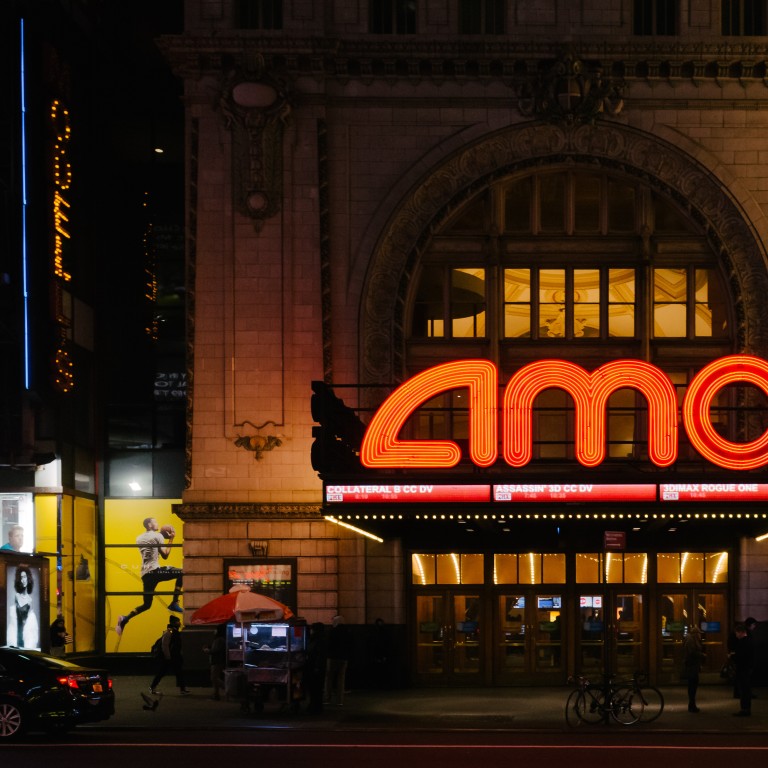
Dalian Wanda’s AMC stake falls to less than 10 per cent after dilution, as tycoon Wang Jianlin’s ambition of assembling a global media-to-property flagship runs aground
- Dalian Wanda Group’s stake in the largest cinema chain in the United States drops to 9.8 per cent, from 23.1 per cent previously
- Wanda’s loss of control is ‘beneficial’, as the group does not need to take the responsibility for AMC’s liabilities and profit losses, a source said
Dalian Wanda Group’s stake in the largest cinema chain in the United States has been diluted to less than 10 per cent, dealing a significant blow to Chinese tycoon Wang Jianlin’s ambition of becoming a global entertainment mogul.
Wanda held 9.8 per cent of AMC Entertainment Holdings’ ordinary shares as of March, down from about 23 per cent at the end of 2020, according to AMC’s annual report filed with the US securities regulator on March 12.
“Although Wanda is no longer the controlling shareholder, it’s still the single largest shareholder,” a source close to the company told the South China Morning Post, declining to be named. “It’s beneficial for Wanda as it doesn’t need to take the responsibility of a controlling shareholder for AMC’s liabilities and losses.”
The dilution was confirmed during a March 10 earnings call by AMC’s chief executive Adam Aron, who added that Wanda retained two board seats at the theatre chain.

Still, Wanda owned around 23.1 per cent outstanding ordinary shares of AMC, and 47.4 per cent of the combined voting power at the end of December. The property-to-entertainment conglomerate exercised on February 1 its right to convert all outstanding Class B ordinary shares to Class A ordinary shares. As of March 3, Wanda held 44 million shares of Class A common stocks of AMC. The shares can be freely traded on the market now.
The conversion came after AMC’s sales of additional shares to raise funds and its conversion of a tranche of bonds into its Class A common shares diluted Wanda’s ordinary share ownership to below 30 per cent. In January, the firm said it would sell 50 million Class A shares to raise funds for general corporate purposes including refinancing. In the same month, a group of creditors decided to covert all US$600 million of AMC’s 2.95 per cent convertible senior secured notes due 2026 into Class A shares.

A dual-class shareholding structure concentrates voting power within certain individuals. AMC’s Class B shares carry more voting rights than Class A stock, with the former granted three votes for each share, according to AMC’s chief executive officer Aron.
“Even after conversion, Wanda may have significant influence over our corporate management and affairs, due to their representation on the Board of Directors and their 9.8 per cent stock ownership as of March 3, 2021, based on our records and information from Wanda,” AMC said in the annual report.
In 2018, “Wanda spent US$600 million and US$100 million fees for facility upgrade; the US$1.9 billion liabilities still belong to AMC,” said Wanda Cultural Industry Group’s president Zhang Lin, adding that the company had already made money on its AMC investment, according to a report by digital media Jiemian. “Wanda only spent US$600 million in the acquisition.”
AMC’s share price soared by more than 500 per cent on the New York Stock Exchange so far this year, as retail investors had flocked to snap up shares such as AMC and GameStop to squeeze out professional short-sellers on the Wall Street. The coronavirus pandemic has hammered the firm, with governments imposing social distance rules and restricted gatherings. Its revenue has plunged 77.3 per cent to US$1.2 billion in the 12 months ended December 31, with annual losses at US$4.6 billion.

